- Home
- Juliet Marillier
Twixt Firelight and Water Page 4
Twixt Firelight and Water Read online
Page 4
I do not know what changed in me. Perhaps it was visiting the hill where once I had picked up a stone patterned in red and grey: fire and earth. Perhaps it was seeing a man with his two little sons, walking on a lake shore and laughing. I remembered that I was not quite alone. If my sacrifice and Lóch’s had not been in vain, somewhere in the north I had a brother. Ciarán would be a man now, close to the age his sombre half-brothers had been when they came for him. I remembered the name Sevenwaters. I considered the bitter, cynical, hopeless creature I was now, and knew I could not bear to live on like this, summer after summer, winter after winter, for all the lengthy span allotted to a half-and-half like myself. If I did not manage to make an end of myself, I would live far longer than the lifetime of an ordinary man. So would Ciarán. I went to find him.
‘Ready to go?’ he asks now. So lost have I been in my reverie that the lesson is finished, the novices have departed without my noticing, and Ciarán is watching me quizzically, his travelling bag strapped up and ready in his hand. Today we head off into the forest for a few days’ solitude. It is our habit to make these quiet journeys from time to time. Ciarán gathers herbs, prays, meditates. I keep him company, making myself useful when I can.
We’ve been together many, many years. His father brought him safely to the nemetons but died not long after, and Ciarán was raised by the druids. A choice was made to let the boy forget what little he knew of his origins. He grew up unaware that his father had been lord of Sevenwaters. In time, that proved costly indeed.
Ciarán became a fine man; a better man than I ever would have been. He had his own share of sorrows. Love drew him away from the druid path awhile. What our mother did to him and his sweetheart was crueller than the punishment she meted out to Lóch and me. Ciarán rose above it. My brother; my strong, clear-headed brother.
‘Come, then,’ he says. I fly to perch on his shoulder, and together we walk off into the forest of Sevenwaters.
* * * *
AISHA
‘Go,’ my father said. ‘Go and find out for yourself.’
It was fair enough. I was a woman grown, and though there were certain expectations I had not fulfilled — by my age, a woman was supposed to have a husband and children — my life so far had contained more than its share of adventures. I could always rise to a challenge. I was my father’s daughter, wasn’t I? He’d done both, the adventures and the family. It was family we were discussing now, the shadowy, mysterious part of it that was away to the northwest in Erin. I’d travelled to many places, but never there.
‘I will,’ I replied. ‘And you can come with me.’
Father laughed, his eyes crinkling up. He had my smallest half-brother, Luis, on his knee and was whirling a wooden rattle. The baby reached for it, shrieking with delight. ‘Me? I’m an old man, Aisha.’
In years, perhaps he was. He didn’t look old, save for the touch of snow in his dark hair and those smile lines on his sun-browned skin. ‘Is that what Mercedes says?’ I asked, knowing my stepmother said nothing of the sort. Mercedes was a few years my junior: my father’s third wife, and mother of his youngest children. Ours was a noisy, busy establishment that saw a constant stream of visitors, mostly folk from the village wanting Father’s advice on matters of law or religion or the care of sick animals. He had become a father to all of them since we settled here. His seafaring days were done; in that sense, perhaps he was old, but there was a vigour about him like that of an aged olive tree, hardy, tough, his roots sunk deep in the land. And fruitful; the children kept coming. The place was full of toddlers and animals — Father had never learned to resist the pleading eyes of a homeless dog.
‘Never mind that,’ he said now. ‘You go. Sail on the Sofia when Fernando next takes her to Dublin. You’re an enterprising girl, Aisha; you can make your own way from there.’
‘And what do I do when I get to Sevenwaters? March up to the front door and say, Good morning, I’m your — what, great-niece? Second cousin? Sorry my father couldn’t come; it’s only been forty years.’
‘Closer to fifty,’ Father said, lifting Luis up against his shoulder. ‘Just as well I taught my children Irish. At least you’ll be able to introduce yourself. Tell them your father’s a doddering ancient who has trouble hobbling as far as the front door. Tell them whatever you like.’
I wondered, for the hundredth time, why the bonds of family had not drawn him home in all those years. With his ships loading and unloading in Dublin regularly, he could easily have gone. Sevenwaters was not so very far north of that port, provided one could negotiate the borders between Norse and Irish territories, which were under ongoing dispute. But while Father had a hundred stories of his boyhood, and a hundred more about heroes, monsters and warrior women, he never talked about what might have become of his kin since he last saw them.
‘I don’t want to know, Aisha,’ he said, reading my thoughts on my face. ‘Every time I got news, in those first years after I left, it was bad news. My brothers dying, one after another, all uselessly. The borders shrinking; war and madness. Besides, I like the sun. It’s always raining in those parts. And I’d miss Mercedes and the little ones.’ After a moment he added, ‘I suppose Conor may be still alive — your druid uncle. It’s been a long time. And my nephew may still be chieftain at Sevenwaters; he was only a lad when my eldest brother died. But they’ll be strangers to you, despite the tie of blood.’
It was hard to think of my father’s family as strangers. They were in the most enthralling of his stories, the one that told of a disaster that had nearly destroyed them all. It included a wicked stepmother — when I thought of Mercedes, this made me laugh, for my father’s rosy-cheeked, smiling young wife was as far from that figure as I could imagine — and a transformation wrought by magic, six brothers turned into swans and saved only by their sister’s courage and endurance. My father had been one of them. I knew those boys from the inside out. I knew the intensity of their anguish; I felt their terror; I understood their guilt. I knew them up till the point when the ordeal was over and my father, Padriac, who was the youngest of them, decided to walk away from Sevenwaters and never look back. And yet they were not real. They were characters in a story, like Cu Chulainn the great hero, or Emer who was turned into a fly. The notion of meeting them in the flesh felt very strange. They would be old now. But perhaps they were like Father. I only had to look into his eyes to see the boy there, the same who had once splinted the legs and salved the wounds of injured creatures in Erin, and who still did it here in Xixón, far from the shores of home.
‘You must miss it sometimes,’ I said. ‘You must miss them.’
‘My life is rich, Aisha,’ said Father, patting his son rhythmically on the back. Luis was hungry; the rattle of pots and pans from the cooking area told me Mercedes was preparing a meal. ‘I’ve made my home wherever I travelled. And you are your mother’s daughter, my dear. A restless soul; an adventurer. So go, and go with my blessing. When you come back, I’ll be ready to hear the tale.’
* * * *
I owed it to both of them, to Father who had always trusted me, no matter how wild an adventure I attempted, and to Mother who had perished at sea while working as his first mate, to go ahead with the plan that had sprung from nowhere. Two months later, I was stepping off the Sofia in Dublin, where my general appearance caused bystanders to gawk and whisper behind their hands. What went relatively unremarked in Galicia was clearly the height of exoticism in this city of wheat-fair, pale-skinned Norsemen and slight, dark Irish. I’d offered to give Fernando a hand with the unloading, but he’d declined, saying I’d only attract crowds that would get in his way. So I wished him well and headed off on my own, telling him I’d pick up a lift home when next he made landfall here.
There were one or two incidents by the wayside. Not every traveller in Erin is respectful of womenfolk, but I’d had plenty of practice at fending off advances of various kinds; there were years and years of dented skulls and bruised privates behind me. At
a wayside inn I arm-wrestled a local farmer for a jug of ale and ended up sharing it with him and his friends. I didn’t talk any more than I needed to. Demonstrating my fluent Irish would only mean all sorts of questions, and idle curiosity bored me. With Father’s map in my head and a sailor’s sense of direction — I’d captained the Sofia for Fernando more than once — I headed north to Sevenwaters.
I reached the edge of the forest at dusk. I had seen plenty of forests in my time, back home in Xixón and in other parts of the world on one voyage or another. Hot, damp forests full of bright birds and howling creatures. Cold, crisp, empty forests where snow bent the boughs of fir and spruce, and bears lay in winter dreams. This was less forest than blanket of darkness, lying over hill and valley in mysterious, shadowy silence. I decided to camp overnight and go on by daylight. It wasn’t just the brooding quiet of the place, the sense of its being somewhere out of ordinary time and space. There were guard posts to north and south, well-manned even at this hour. Likely the whole forest was ringed by them. I didn’t suppose those guards would put an arrow through me first and ask questions later. But they might well try to apprehend me. I hadn’t decided yet how I would introduce myself to my father’s long-lost family, but I knew I didn’t intend to walk into their hall with a spear shoved in my back and some man at arms announcing that he’d caught me spying.
It was a cold night. I made no fire, but slept rolled in my blanket. Soon after dawn I packed up and set out into the forest. Somewhere in these woods there was a lake, a big one. Beside the lake was a keep, and in that keep lived the family of Sevenwaters, my father’s kin.
Father had warned me about the paths through this forest, both directly, when he knew I was coming here, and indirectly, through the stories he’d told over the years. I’d never been sure whether to believe the implication that eldritch folk made their homes here alongside the human ones. In the tales there were two other races of people in Erin, both of them ancient. Understanding between the various groups was quite unusual in other parts of the land, but at Sevenwaters they all lived more or less side by side. When a person told tales about cows with wings and giant serpents that spewed up precious stones, it did lead one to assume that he was given to flights of the imagination. On the other hand, Father was the most practical of men, whether removing a thorn from the foot of a dog or talking over trade matters with Fernando and me. Besides, there was one especially uncanny story in his past that I had come to believe must be true, the one about him and his brothers being turned into swans. So perhaps he was right about the paths through the Sevenwaters forest changing of their own accord from one day to the next. It was to keep out strangers, he had explained. Many was the traveller who had gone astray somewhere in this tangle of pathways, only to come to light years later as a little pile of bleached bones. But I would be all right; I would find the way. I was family. For me the paths would lead where they should.
I considered this as I headed further into the dense and murky woods. It was all right in theory. The difficulty lay in the fact that I looked nothing like Father. Since stepping off the Sofia in Dublin I had seen no woman, and few men, as tall as I was; I had seen nobody, male or female, with skin as dark as mine. My features were not those of an Irishwoman. I took after my mother’s side of the family. How would these uncanny forces — supposing they did exist — pick me out as my father’s daughter when all the outward signs suggested I was as out of place here as an olive in a bowl of grapes? It was supposed to be less than one day’s walk from the forest’s edge to the keep of Sevenwaters, depending on where one started. Since I was heading for a lake, I’d find a stream and follow its course. I’d watch out for markers — rock formations, notable trees, ponds, clearings — and with luck I would reach my destination before nightfall.
It was a pleasant enough walk, for the main part. The woods were not as empty as they’d seemed in that odd dusk light, but full of birds and other creatures about their daily business. I saw no uncanny folk, but I spotted a deer, a wild pig and a wary fox. I found a stream and, after refilling my water skin, I followed its course as best I could. Here and there the waterway lost me, gurgling among tumbled rocks netted with brambles. The day passed, and the massed trees stretched ahead. By morning light I had admired the myriad greens of their foliage, the patterns of sun and shade, ever-changing; I had enjoyed walking to the sound of rustling leaves and calling birds. Now, in late afternoon, they were starting to look more like guards, an army of dark trunks blocking my way. I found I was longing for open ground.
I walked on, sure I was heading due west, yet uneasy, for there was a sameness about this row of leaning beeches, this stone somewhat resembling a toad, that suggested I had passed this way before. I was not the kind of traveller who walked in circles. There was a true direction in me; I had never been lost. Under my breath I uttered one or two choice epithets, keeping to Galician, though with only the poxy trees to hear me I might just as well have cursed in Irish. This was ridiculous. If I didn’t find a better path soon I’d be spending the night in here. All right, I had a blanket, I had food and water, I had slept in far less comfortable places in my time, but I grappled with the sense that the forest of Sevenwaters was shutting me out. Or in.
‘My grandfather was a chieftain of Sevenwaters,’ I said aloud, finding myself faintly ridiculous. ‘If I can’t come in, who can?’
I expected no reply and I got none, save for the mocking kraak of a raven as it flew to alight on a branch nearby. The creature turned its head to one side, assessing me. Was I imagining things, or did it have a particularly inimical expression in its eye? As I looked up, it flew a short distance away, then alighted and peered at me again.
‘Would I trust a bird with eyes like those to show me the way?’ I muttered. ‘Not for an instant. But as I’m headed in that direction anyway, by all means tag along.’
The light was fading fast. The thick canopy and the filtered sun had made me misjudge the time of day. With hardly a clearing to be found and the broad, leaf-strewn paths of this morning completely absent, the wise choice would be to make camp the next time I came upon some rocks that might provide shelter, and accept the fact that I would not reach the keep today.
There were, of course, no rocks. I was starting to believe Father’s stories now, and wishing I had asked him for better directions. As for the wretched raven, I didn’t like the look of it at all. It seemed altogether too knowing for a wild creature, and it wouldn’t go away.
‘Rocks,’ I said, slithering down a muddy incline bordered by stinging nettles. ‘An outcrop, perhaps a cave, that’s what I want.’ I eyed the bird with distaste, wondering if ravens made good eating. I suspected this one’s flesh would be as tough and bitter as the look in its eye. I slid to a halt, digging my walking staff into the ground. ‘Or then again ...’
We had emerged at the edge of a small, circular glade. It was a patch of light in the dark forest, and in its centre the stream flowed into a neat pool circled by flat stones. A campfire burned on the stones, and by it sat a man, cross-legged. His back was as straight as a child’s, his hair a striking dark auburn, his eyes a peculiar shade of mulberry. He looked around my own age, and was clad in a long grey robe. As I stood at the edge of the clearing, waiting for him to speak, the raven winged its way over and landed on his shoulder. I winced, imagining those claws digging in.
The red haired man rose gracefully to his feet. His garb seemed that of a religious brother of some kind, though I saw neither cross nor tonsure. All he wore around his neck was a white stone strung on a cord.
‘Please, warm yourself at our campfire,’ he said courteously. ‘We see few travellers here. Have you lost your way?’
I moved forward, feeling not only his gaze but that of the bird. ‘Thank you,’ I said. ‘Lost my way? Not exactly.’ I studied the pair more closely, wondering if there was anything uncanny about them. I wasn’t sure how one could tell. There was a neatly strapped bundle over near the trees and a blanket spread
out, as well as cooking gear and some other items — corked jars, a little book, a bundle of rowan twigs, a sheaf of herbs. I saw no weapons. ‘I’m heading for the keep of Sevenwaters. It can’t be far from here.’
‘Less than a mile as the crow flies,’ the man said. ‘But dusk is close. I’d advise you to wait until morning, then we can walk on with you and show you the way. You’re welcome to camp here, if you wish.’
Not a word about who I was or the nature of my business. I liked that. On the other hand, it showed a remarkable lack of caution. What was to stop me from sticking a knife in the fellow’s back and making off with all his worldly goods?
The raven gave a kraaa, which I interpreted as: Don’t flatter yourself, we can overpower you with our eyes shut, or something to that effect. I shot the bird a look of dislike. ‘Unusual pet,’ I commented, putting down my pack and lowering myself to sit beside it.

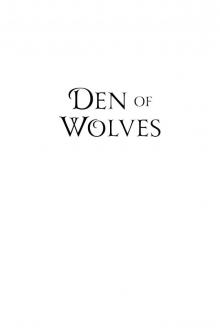 Den of Wolves
Den of Wolves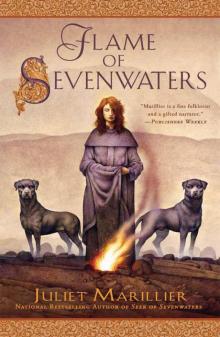 Flame of Sevenwaters
Flame of Sevenwaters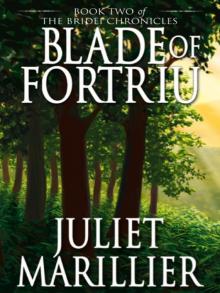 Blade of Fortriu
Blade of Fortriu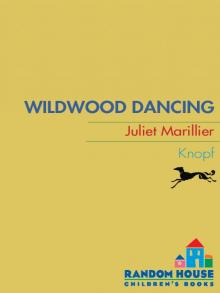 Wildwood Dancing
Wildwood Dancing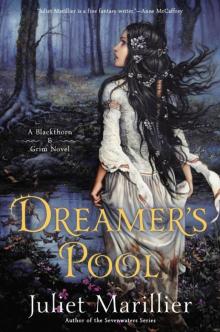 Dreamer's Pool
Dreamer's Pool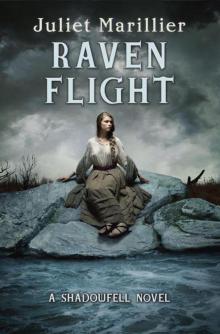 Raven Flight
Raven Flight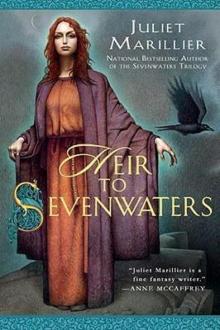 Heir to Sevenwaters
Heir to Sevenwaters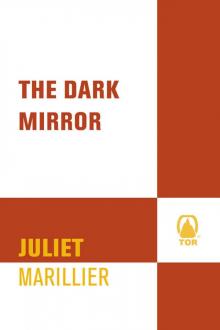 The Dark Mirror
The Dark Mirror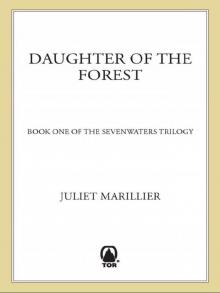 Daughter of the Forest
Daughter of the Forest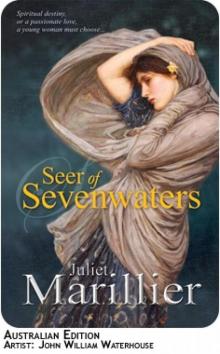 Seer of Sevenwaters
Seer of Sevenwaters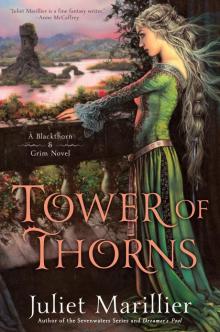 Tower of Thorns
Tower of Thorns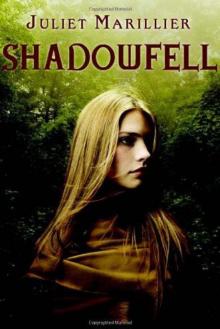 Shadowfell
Shadowfell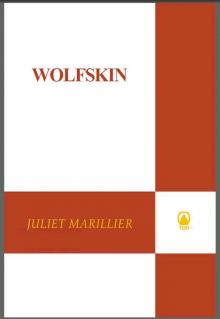 Wolfskin
Wolfskin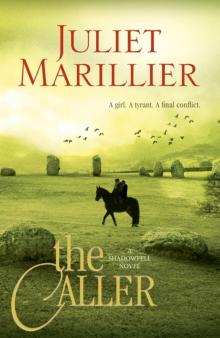 The Caller
The Caller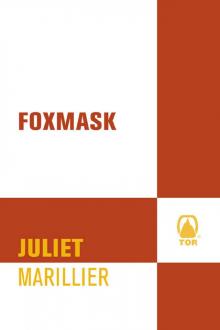 Foxmask
Foxmask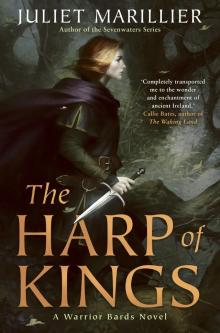 Harp of Kings
Harp of Kings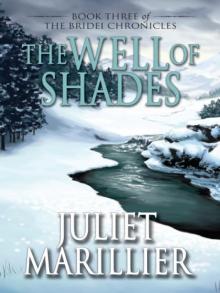 The Well of Shades
The Well of Shades Heart's Blood
Heart's Blood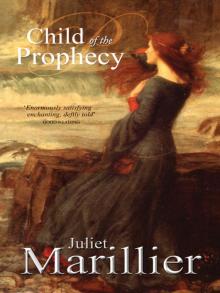 Child of the Prophecy
Child of the Prophecy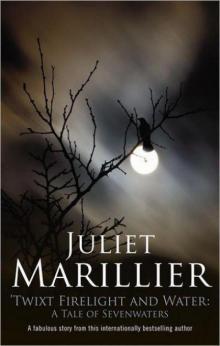 Twixt Firelight and Water
Twixt Firelight and Water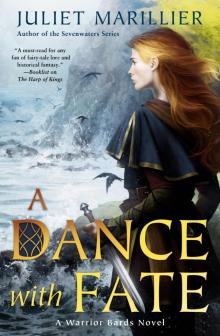 A Dance with Fate
A Dance with Fate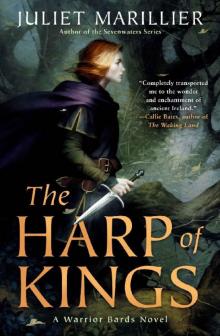 The Harp of Kings (Warrior Bards)
The Harp of Kings (Warrior Bards)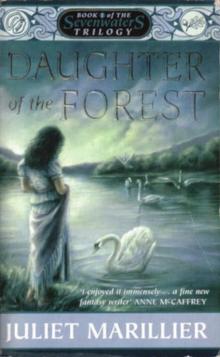 Daughter of the Forest (The Sevenwaters Trilogy)
Daughter of the Forest (The Sevenwaters Trilogy)![Sevenwaters [06] Flame of Sevenwaters Read online](http://i1.bookreadfree.com/i2/04/08/sevenwaters_06_flame_of_sevenwaters_preview.jpg) Sevenwaters [06] Flame of Sevenwaters
Sevenwaters [06] Flame of Sevenwaters![[Sevenwaters 04] Heir to Sevenwaters Read online](http://i1.bookreadfree.com/i2/04/12/sevenwaters_04_heir_to_sevenwaters_preview.jpg) [Sevenwaters 04] Heir to Sevenwaters
[Sevenwaters 04] Heir to Sevenwaters